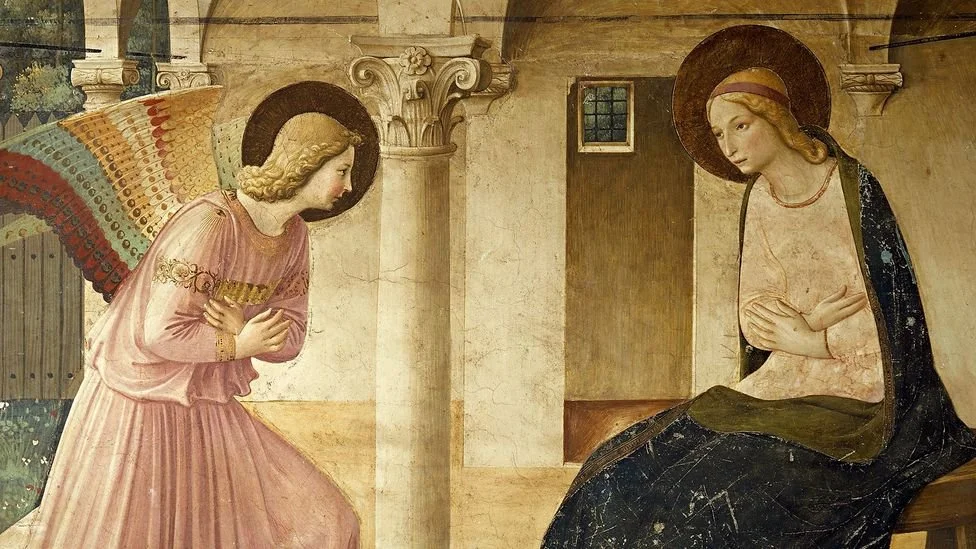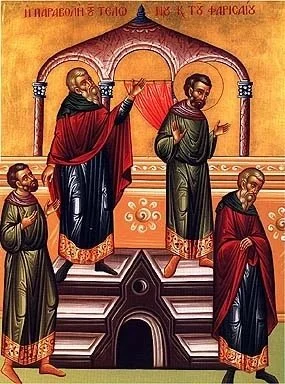
The Daily Word
Get the Daily Word in Your Inbox!
The Lord Draws Close To Us
As mentioned in a previous entry, feast days are usually not celebrated as such during Lent except generally for two solemnities that occur during the Lenten Season: St. Joseph and today, the Annunciation of the Lord. Although very commonly mistaken, this solemnity is not about Mary being conceived but rather the day when Jesus was conceived in Mary’s womb by the overshadowing of the Holy Spirit.
“Therefore the Lord himself will give you this sign:
the virgin shall be with child, and bear a son,
and shall name him Emmanuel,
which means ‘God is with us!’”Isaiah 7:14
First published as “Never Alone” on March 25, 2022.
As mentioned in a previous entry, feast days are usually not celebrated as such during Lent except generally for two solemnities that occur during the Lenten Season: St. Joseph and today, the Annunciation of the Lord. Although very commonly mistaken, this solemnity is not about Mary being conceived but rather the day when Jesus was conceived in Mary’s womb by the overshadowing of the Holy Spirit.
After refusing to ask the Lord for a sign as He had told him to, the Prophet Isaiah told King Ahaz that the Lord Himself will give him a sign: a virgin will bear a son whose name will be Emmanuel, “God is with us.” A little over 700 years later, the Angel Gabriel went to a young woman by the name of Mary who lived in a little town in Galilee called Nazareth and greeted her with “Hail, full of grace! The Lord is with you.”
In the Gospel of Luke we see the fulfillment of the prophecy spoken of by Isaiah to King Ahaz. King Ahaz was told the child will be named Emmanuel meaning “God is with us” and the first words the Angel said to Mary reiterated it, “The Lord is with you.” At the Annunciation, God became man, the Word became flesh and dwelt among us. This dwelling is further illustrated by the “overshadowing,” recalling the cloud imagery in the Old Testament where God encountered Moses and the cloud descending upon the “Holy of Holies” in the temple where the Ark of the Covenant is, signifying the presence of God. Mary is the new Ark of the Covenant for Jesus is the New Covenant. God dwelled within Mary and when it was time Jesus who is God-with-us came into the world making His dwelling among all of us. God’s presence is here.
Today we are invited to be bearers of Christ who has made His dwelling within us, knowing that we are never alone because God is with us. May we say a prayer of thanksgiving today for the great love God has for us, to the point of becoming one of us, taking on our human nature so that He might redeem us from its deathly effects. Because Jesus assumed a human nature, we now dare share in His divine nature. In Christ we are never alone. Even when all seems dark and hopeless we only need to remember the Angel’s words, “The Lord is with you.” God has made His dwelling among us, what or whom should we fear?
Be Thou My Vision
The Fourth Sunday of Lent is known as “Laetare Sunday” similar to the Third Sunday in Advent, “Gaudete Sunday,” both reminding us to “rejoice!” In the midst of the penitential season of Lent when we prepare our hearts to once again say “yes” to Jesus and “no” to Satan and to walk with Our Lord as we remember His passion, death, and Resurrection, the Church implores us today to rejoice. Why?
“While I am in the world, I am the light of the world.”
John 9:5
The Fourth Sunday of Lent is known as “Laetare Sunday” similar to the Third Sunday in Advent, “Gaudete Sunday,” both reminding us to “rejoice!” In the midst of the penitential season of Lent when we prepare our hearts to once again say “yes” to Jesus and “no” to Satan and to walk with Our Lord as we remember His passion, death, and Resurrection, the Church implores us today to rejoice. Why? Because we know how the story ends. We know that in His Resurrection Christ has triumphed over sin and death and that we have the gift of salvation. While here on earth we still fight the battles against the enemy, but we know that the war has been won once and for all.
In today’s Gospel we are presented with our second “character” Gospel that we read during Lent — the man born blind. This man was blind from birth and yet the people assume that it was a punishment from God for the sins of either the man himself or his parents, but Jesus tells them otherwise. The man was born blind not because of sin, but because through what seems like a punishment in the eyes of the world, God will show His power through it: He will make him see. We can imagine the great rejoicing this man shows when he sees for the very first time. But not everyone was rejoicing.
While the man himself and perhaps others in town rejoiced with him, the Pharisees questioned and plotted. They made up every reason they could to doubt that this man, who indeed was born blind, had been cured by Jesus. When this seemed futile, they turned it back on Jesus, condemning Him for curing on the Sabbath. The Pharisees followed the letter of the law, but forgot about the heart or spirit of the Law and the Lawgiver Himself. That is why Jesus said He came not the abolish the Law, but to fulfill it.
You see, the world sees that the blind one here is really the man who was born blind, but in reality it is the Pharisees who are really blind. They may have the power of physical sight, but they are spiritually blind, blind in their hearts. Do we see as Jesus sees or as the world sees? I chose to give this reflection the title of one of my favorite hymns, “Be Thou My Vision,” because it is so fitting. If we see with the eyes of Christ, how much more beautiful the world and our lives would be. If we can see the homeless and poor as beloved children of God instead of problems to be rid of or the “acting out” of those around us as a cry for help instead of an excuse to judge and retaliate, this world of ours would be so much more peaceful. But, too many of us choose to not have Christ as our vision, but rather choose to see only from our own perspectives, our own desires and preferences, and our own pride and arrogance. We have chosen to see with the eyes of the world and of the enemy.
Let us today examine our hearts and minds and be honest with ourselves and with God about the places within us that experience blindness. Where are the places in our hearts that are closed off to God, others, and even our very selves? Jesus wants to cure us of our blindness, but only if we want to. Do we want to see?
May we today ask the Lord to cure us of our spiritual blindness so that we may truly allow Christ, who is the Light of the World, to shine in our hearts and through our bodies so that we might come to see one another as we truly are: brothers and sisters, beloved sons and daughters of God who is love itself. “Lord, be thou my vision!”
I encourage you to listen to “Be Thou My Vision” today. If you do not know the hymn, “Be Thou My Vision,” here is a link to a YouTube video of it. Here is a video with the lyrics. For just the lyrics, see this website.
Righteous in the Heart
It can be a temptation for regular churchgoers to think perhaps we might be in some way better than those who only go to Church once in a while or never at all. This can be dangerous territory. Absolutely. Should we go to Church every Sunday? Absolutely. Is it good that we go to Church every Sunday? Does it make us any better? Not necessarily.
“Jesus addressed this parable
to those who were convinced of their own righteousness
and despised everyone else.”Luke 18:9
First published as “False Piety” on October 23, 2022.
It can be a temptation for regular churchgoers to think perhaps we might be in some way better than those who only go to Church once in a while or never at all. This can be dangerous territory. Absolutely. Should we go to Church every Sunday? Absolutely. Is it good that we go to Church every Sunday? Does it make us any better? Not necessarily.
The answer lies in the intention that is within our heart. Why do we go to Church? Because we have to? Because it’s an obligation? What do I do at Church? Do I simply stand when others stand, sit when others sit, kneel when others kneel, and say the responses from memory? Our physical bodies may be in those pews, but where are our hearts?
In the Parable of the Pharisee and the Tax Collector, Jesus discusses the concept of “self-righteousness” and the eternal consequences of that. Both went up to the Temple area to pray, but only one actually prayed, while the other boasted about himself. Although the Pharisee went to the Temple, his heart was not set on God, but rather on all of the good things he thinks he is doing. On the other hand, the tax collector in his humility and perhaps even in his shame, bows down his head and pleads for mercy to God. Both were in the same place, in the same sacred space, but only one for the right reason. God only heard the tax collector because only the tax collector was talking with Him from his heart. Who do we talk to when we pray?
Brothers and sisters, where are our hearts? Do we focus on what we have done and the many good things we may be doing or do we focus on the many good things God has done for us, through us, and in us? Prayer is not about talking at God, but rather talking with God. True piety requires humility and knowing that we are not perfect and are in need of God’s mercy. May we seek true righteousness of heart and not self-righteousness. Let us take a good look at our hearts today and invite God inside, confident that He will hear us and have mercy on us.
“I tell you, the latter went home justified, not the former; for everyone who exalts himself will be humbled, and the one who humbles himself will be exalted” (Luke 18:14).



